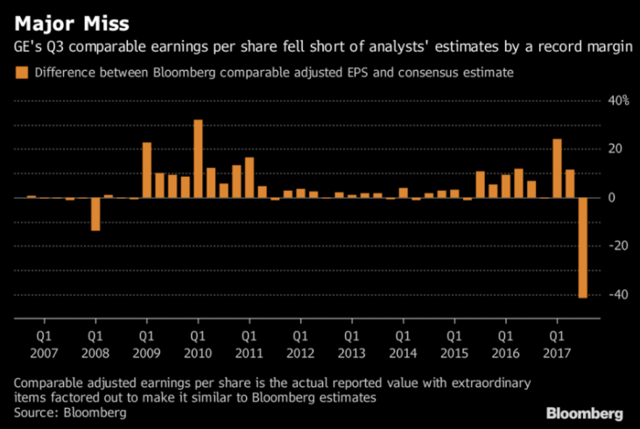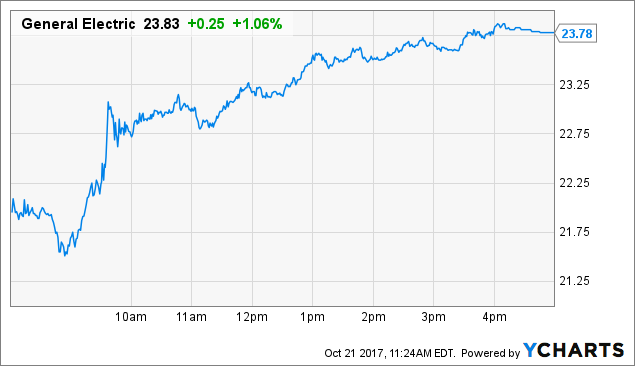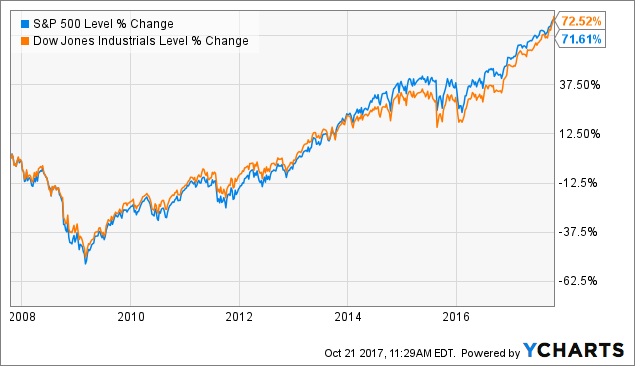Friday GE Fiasco Exposes A Fluff Fueled Market
by: Orange Peel Investments
- GE stock is aggressively bid back up on Friday after an ugly earnings report.
- This is a microcosm of how the overall market thinks right now and that might not be a great thing.
- We explain our reasoning.
- This is a microcosm of how the overall market thinks right now and that might not be a great thing.
- We explain our reasoning.
We have been saying over and over for the last year or two that this market has been fueled by pure euphoria and that many staple stocks are simply going to find a bid, no matter what, because every dip looks like a bargain to this market, regardless of the company's underlying financials and what the narrative of the story may be. No better example of this was on Friday of this week when General Electric (GE) put forth an earnings report that greatly disappointed the street, slashed full year guidance and missed on most expectations that analysts and investors had put forth for the company.
Although this article isn't about General Electric per se, here is a quick look at what the company had to say about the numbers it reported on Friday. Bloomberg reported,
General Electric Co.’s new boss promised “sweeping change” as he delivered a brutal assessment of the 125-year-old manufacturer.
Results for the latest quarter are “completely unacceptable,” Chief Executive Officer John Flannery told investors on Friday as he slashed the profit forecast and pledged to unload $20 billion of GE businesses. “We need to make some major changes with urgency and a depth of purpose.”
Flannery, who took over Jeffrey Immelt’s longtime post less than three months ago, is plotting a dramatic overhaul at the maker of jet engines and ultrasound machines.
Already, he has welcomed a representative of activist investor Trian Fund Management to GE’s board and announced major management changes. He’s seeking deeper cost cuts and investors are bracing to see if GE cuts its dividend for only the second time since the Great Depression.
“Everything is on the table,” Flannery said on a conference call to discuss quarterly earnings. “Things will not stay the same at GE.”
As you can see, it was certainly an unceremonious earnings release for the company and the market let the company know this. In early trading, GE shares were down as much is 7% at one point. Almost all of the headlines across the board on major news networks and in publications included General Electric's disappointing results.
But what do disappointing results even mean to this market nowadays? In the case of GE on Friday, apparently nothing. The report, which caught many by surprise, was already "old news" by the end of the day. As you can see from the chart below, the market came in and bid up GE stock all the way back to where it closed the past session and then even nudged it green slightly before the close.
But what do disappointing results even mean to this market nowadays? In the case of GE on Friday, apparently nothing. The report, which caught many by surprise, was already "old news" by the end of the day. As you can see from the chart below, the market came in and bid up GE stock all the way back to where it closed the past session and then even nudged it green slightly before the close.
If this is not sure fire proof that 10 years of a bull market have conditioned anyone and everyone to just buy the dips without asking, we don’t know what is.
One might be able to deflect some of the blame to the fact that Dow futures were already up about 100 points overnight on news that the Senate had passed the budget that the president needs in order to put his tax cuts through. Because of this, market sentiment was generally strong heading into the day on Friday, even though these tax cuts continued to already be priced in many times over.
But the market ignoring something like a company slashing its earnings guidance by about 35% is simply stunning to us. Shock Exchange pointed out in their article on Friday morning,
But the market ignoring something like a company slashing its earnings guidance by about 35% is simply stunning to us. Shock Exchange pointed out in their article on Friday morning,
GE slashed its earnings outlook for the rest of 2017. Adjusted earnings are expected to be $1.05 to $1.10 per share, down from a previous range of $1.60 to $1.70. The mid-point of its new earnings estimate ($1.08) is lower by about 35% compared to the previous mid-point. The fact that it lowered its full-year outlook could imply that Q3 was not an anomaly.
By keeping the company priced at the same price as it closed at the day prior, this 35% instantly becomes pure multiple expansion for the company. What types of companies deserve multiple expansion? Those that are growing organically and those whose growth is accelerating. This is the best case scenario for why a company would see its multiple expand.
Additionally, if a company is showing significant margin improvement in one or all segments, the market may determine that its multiple could be worthy of expanding.
However, this is simply not the case when it comes to GE. In fact, the opposite is happening. The company‘s financials are deteriorating and looking less and less attractive to us on a fundamental basis. This is the scenario where we believe multiple compression is far more appropriate than multiple expansion.
GE is still now trading over 20 times what it is expected to earn this year and remains relatively aggressively priced for a company that has just missed its earnings mark in a big way, we believe.
But this article isn’t really that much about GE, it is about GE being a symptom of an overall market attitude that we believe is toxic and will eventually produce more harm than good. The market doesn’t seem to carefully assess multiples anymore. It doesn’t seem to really ever think twice when it comes to buying a dip in any type of "staple" stock. If you are Warren Buffett, and are planning on holding for 40 years, this might not be such terrible scenario. However, we know that this certainly isn’t the outlook of all market participants and definitely not 100% of the market participants that would be needed to engineer a reversal in shares like General Electric that we saw on Friday.
GE is still now trading over 20 times what it is expected to earn this year and remains relatively aggressively priced for a company that has just missed its earnings mark in a big way, we believe.
But this article isn’t really that much about GE, it is about GE being a symptom of an overall market attitude that we believe is toxic and will eventually produce more harm than good. The market doesn’t seem to carefully assess multiples anymore. It doesn’t seem to really ever think twice when it comes to buying a dip in any type of "staple" stock. If you are Warren Buffett, and are planning on holding for 40 years, this might not be such terrible scenario. However, we know that this certainly isn’t the outlook of all market participants and definitely not 100% of the market participants that would be needed to engineer a reversal in shares like General Electric that we saw on Friday.
One scenario we can envision, based on Friday's buying, is that perhaps an activist investor used the volume spike and price fall to leg into a position. We will know if this is the case over the coming days.
But regardless, the market, in general, is getting less and less critical. As the euphoria of this bull market continues to pick up steam, we believe that investors are demanding less transparency and less financial performance from the stocks that they own. We simply believe that market participants are more inclined to just throw good money after bad because the market has done nothing but go up for nearly 10 years and, at this point, nobody can really fathom anything different.
But regardless, the market, in general, is getting less and less critical. As the euphoria of this bull market continues to pick up steam, we believe that investors are demanding less transparency and less financial performance from the stocks that they own. We simply believe that market participants are more inclined to just throw good money after bad because the market has done nothing but go up for nearly 10 years and, at this point, nobody can really fathom anything different.
Junior analysts on Wall Street today were probably in about 6th grade when the 2008 recession happened. Newcomers to Wall Street and investing literally don't know any better.
After all, the last few major dips in the market, resulting from the Chinese stock market crashing and the presidential election, were both bought aggressively. What are investors to think when they see an event like Brexit drop stocks down substantially before they are bid all the way back up and then tack on an additional gains?
The market has been carefully conditioning investors over these last 10 years to simply go in and buy at any given chance at any given time, regardless of situations and circumstances, we believe. This exuberance comes as a result of Fed policy which has pushed for, and encouraged, low interest rates, slamming the market with cheap capital so that individuals and companies can lever up in order to either buy stock for themselves or buy back their company’s stock. Asset prices continue to rise and the bubble just gets bigger.
Could you imagine what the attitude would be in 2008 if General Electric had cut its earnings outlook by 35%? The stock would be down that 35%, probably plus an additional 5% or 10% based on the perception of the company's outlook. Sentiment matters and market psychology matters. Right now, our market psychology is throwing most caution to the wind, we believe.
Could you imagine what the attitude would be in 2008 if General Electric had cut its earnings outlook by 35%? The stock would be down that 35%, probably plus an additional 5% or 10% based on the perception of the company's outlook. Sentiment matters and market psychology matters. Right now, our market psychology is throwing most caution to the wind, we believe.
General Electric was a great example of that on Friday. We think it makes an alarming overall commentary about the market and we think it reaffirms our long-held believe that we are getting close to reaching peak euphoria, a point that may eventually foreshadow a much-needed pull back or recession.



0 comments:
Publicar un comentario